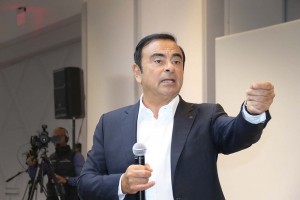
Renault-Nissan-Mitsubishi Alliance chief Carlos Ghosn will get the man he wants to succeed him when he retires: COO Thierry Bollore.
Carlos Ghosn’s plan to name his successor later this week has cleared a critical hurdle despite creating some turmoil – including the resignation of one of French automaker Renault’s senior board members.
The French government, which owns a major stake in Renault, now says it will accept Ghosn’s plan to appoint Thierry Bollore as the carmaker’s chief operating officer and his heir-apparent. But the government also said that it wants an agreement that Ghosn will push to form an “integrated” company – translation: a merger – with Japan’s Nissan, rather than the current alliance structure. Ghosn has long preferred to see the two companies coordinate efforts but remain independent.
Ghosn, who will turn 64 next month, is expected to be given another four-year contract as chairman, CEO and president of Renault in June, but naming Bollore his successor “is perfectly acceptable to the French shareholder,” according to a source in the government’s finance ministry who spoke to the Reuters news service on Monday.
There had been some serious questions about how the proposal would play out at a board meeting on Thursday after word leaked out that Thierry Desmarest, a senior board member and former chairman of oil giant Total, was resigning. The French automaker has told other members of the board that Desmarest’s sudden exit is the result of a newly discovered conflict of interest, the wire service reports.
(Turmoil at Renault as Ghosn looks to choose successor. Click Here for the story.)

Thierry Bollore, currently chief operating officer of Renault, is CEO Carlos Ghosn's choice to succeed him when he retires.
Desmarest was said to be opposed to the move, one of several board members who wanted a broader search for a Ghosn successor. Though a recruiting firm had suggested Renault turn to Toyota’s European chief, Didier Leroy, Ghosn apparently did not consider any outsider for his replacement.
While Ghosn has shown no interest in retiring, he has been restructuring his role in the Renault-Nissan Alliance, especially following its addition of troubled Mitsubishi to its portfolio. In April 2017 the Brazilian-born executive stepped down as Nissan CEO, turning the reins over to Hiroto Saikawa, so he could focus on rebuilding the long-struggling Mitsubishi.
His next move could see him pulling back from day-to-day operations at Renault, where he has been serving as president and CEO since 2005 — adding the chairman’s duties in 2009.
But Ghosn’s transition plans have not gone smoothly. One-time heir apparent Carlos Tavares left the Alliance in 2013 after an apparent dispute and the unusual move by Tavares of suggesting he might be opening to run another carmaker, such as Ford or General Motors. He now heads French rival PSA Group, owner of the Peugeot and Citroen brands.
More recently, the French government – which holds a major stake in Renault – has been resisting some of Ghosn’s plans. That clash reached a boil in 2015 when the French government increased its stake and pressed Renault to completely take over Nissan — in which the French company currently holds a 43.4% stake. Ghosn ultimately blocked that move but he now is expected to face renewed pressure to formally marry the two companies.
For its part, Nissan now holds a controlling 34% stake in Mitsubishi, which it received as part of a 2016 bailout. It has become the third leg in the Renault-Nissan Alliance. Significantly, with the addition of the smaller Japanese company the alliance surged to become the world’s best-selling automotive group in 2017, narrowly toppling 2016 industry leader Volkswagen AG and solidly surpassing Japanese giant Toyota.
(Click Here for details about Renault-Nissan-Renault creates $1 billion venture fund.)
Reuters quoted the French Finance Ministry source as declaring that Renault and Nissan must be “better integrated,” a concern that appears to center around what would happen when Ghosn does eventually retire from his role as CEO of the Alliance.
“We need to prepare the future of the alliance,” he told the news source, cautioning that the group is too “heavily dependent on Carlos Ghosn as a person.”
Whether Ghosn, Nissan CEO Saikawa and other shareholders will agree is far from certain. But the two executives, in particular, have frequently declared their belief that the alliance operates best in its current structure.
Bollore has not made his own position clear, but he is a long-time colleague and ally of Ghosn’s, their relationship dating back nearly three decades. Like the Renault CEO, the French-born executive previously worked at Michelin, joining France’s big tiremaker in 1990. He moved to automotive mega-supplier Faurecia in 2005 and came to Renault in 2012. He has had extensive experience abroad, including time in Japan while at Michelin.
(Renault-Nissan-Mitsubishi takes global sales lead. Click Here for the story.)
Bollore will clearly be under pressure to tow the government line, however, the Finance Ministry official making it clear to Reuter’s its support is conditional. “If we were to realize later that there was a problem, we would still have time to change our approach.”
